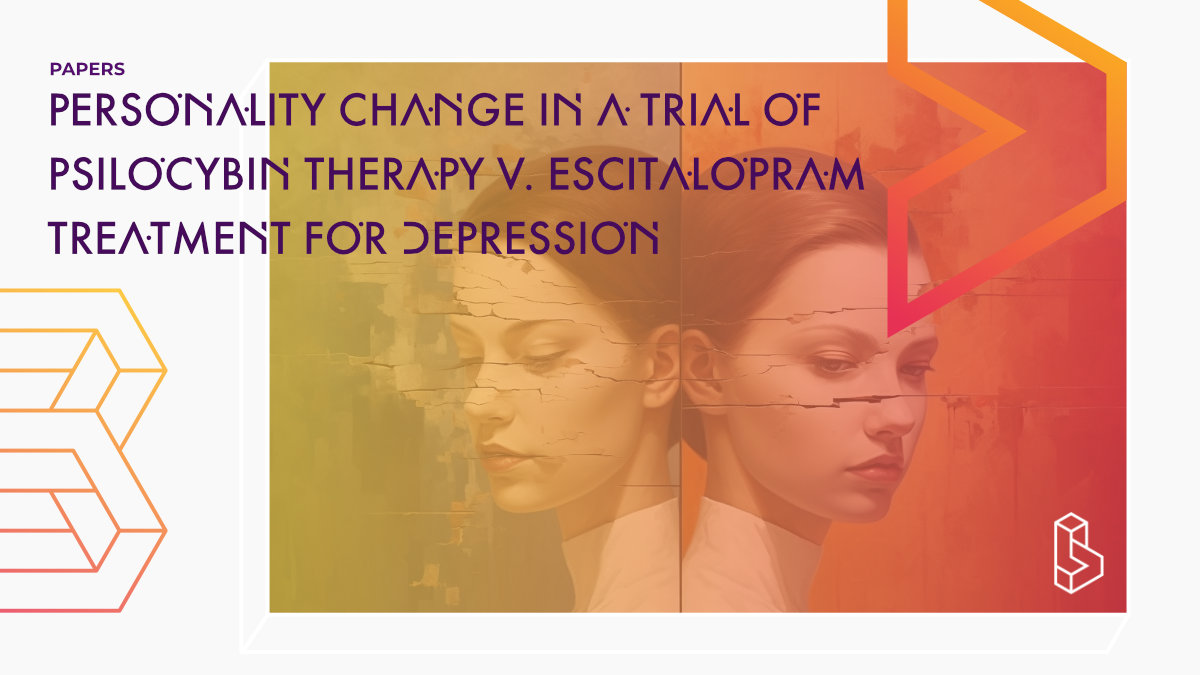This analysis of an RCT (n=59) investigates the impact of psilocybin-assisted therapy (PAT) and escitalopram on personality traits in patients with moderate-to-severe major depressive disorder over a 6-week trial period. Significant decreases in neuroticism, introversion, disagreeableness, and impulsivity, and increases in absorption, conscientiousness, and openness were observed in the PAT group, while similar changes were seen in the escitalopram group. No significant between-condition differences were found, suggesting that both treatments resulted in personality changes consistent with improved mental health. It’s also noted that expectancy did not moderate the response to PAT, unlike escitalopram, whose changes in personality were significantly influenced by pre-trial positive expectancy.
Abstract of Personality change in a trial of psilocybin therapy v. escitalopram treatment for depression
“Background Psilocybin Therapy (PT) is being increasingly studied as a psychiatric intervention. Personality relates to mental health and can be used to probe the nature of PT’s therapeutic action.
Methods In a phase 2, double-blind, randomized, active comparator controlled trial involving patients with moderate-to-severe major depressive disorder, we compared psilocybin with escitalopram, over a core 6-week trial period. Five-Factor model personality domains, Big Five Aspect Scale Openness aspects, Absorption, and Impulsivity were measured at Baseline, Week 6, and Month 6 follow-up.
Results PT was associated with decreases in neuroticism (B = −0.63), introversion (B = −0.38), disagreeableness (B = −0.47), impulsivity (B = −0.40), and increases in absorption (B = 0.32), conscientiousness (B = 0.30), and openness (B = 0.23) at week 6, with neuroticism (B = −0.47) and agreeableness (B = 0.41) remaining decreased at month 6. Escitalopram was associated with decreases in neuroticism (B = −0.38), disagreeableness (B = −0.26), impulsivity (B = −0.35), and increases in openness (B = 0.28) and conscientiousness (B = 0.22) at week 6, with neuroticism (B = −0.46) remaining decreased at month 6. No significant between-condition differences were observed.
Conclusions Personality changes across both conditions were in a direction consistent with improved mental health. With the possible exception of trait absorption, there were no compelling between-condition differences warranting conclusions regarding a selective action of PT (v. escitalopram) on personality; however, post-escitalopram changes in personality were significantly moderated by pre-trial positive expectancy for escitalopram, whereas expectancy did not moderate response to PT.”
Authors: Brandon Weiss, Induni Ginige, Lu Shannon, Bruna Giribaldi, Ashleigh Murphy-Beiner, Roberta Murphy, Michelle Baker-Jones, Jonny Martell, David J. Nutt, Robin L. Carhart-Harris & David Erritzoe
Summary of Personality change in a trial of psilocybin therapy v. escitalopram treatment for depression
In one recent trial, psilocybin therapy (PT/PAT) was comparable to escitalopram therapy (ET) across most depression outcomes measured, but not the primary outcome. This was notable given PT’s demonstrated efficacy in treating depression and the even greater efficacy of combined SSRI pharmacotherapy and psychotherapy.
The present study used the Five-Factor model of personality to examine PT’s treatment effects on depression within the Carhart-Harris et al., 2021 sample.
Find this paper
Personality change in a trial of psilocybin therapy v. escitalopram treatment for depression
https://doi.org/10.1017/S0033291723001514
Open Access | Google Scholar | Backup | 🕊
Cite this paper (APA)
Weiss, B., Ginige, I., Shannon, L., Giribaldi, B., Murphy-Beiner, A., Murphy, R., ... & Erritzoe, D. (2023). Personality change in a trial of psilocybin therapy v. escitalopram treatment for depression. Psychological Medicine, 1-15.
Study details
Compounds studied
Psilocybin
Topics studied
Personality
Study characteristics
Original Re-analysis
Placebo-Controlled
Active Placebo
Double-Blind
Randomized
Participants
59
Humans
Authors
Authors associated with this publication with profiles on Blossom
David NuttDavid John Nutt is a great advocate for looking at drugs and their harm objectively and scientifically. This got him dismissed as ACMD (Advisory Council on the Misuse of Drugs) chairman.
Robin Carhart-Harris
Dr. Robin Carhart-Harris is the Founding Director of the Neuroscape Psychedelics Division at UCSF. Previously he led the Psychedelic group at Imperial College London.
Institutes
Institutes associated with this publication
Imperial College LondonThe Centre for Psychedelic Research studies the action (in the brain) and clinical use of psychedelics, with a focus on depression.
Compound Details
The psychedelics given at which dose and how many times
Psilocybin 25 mg | 2xLinked Research Papers
Notable research papers that build on or are influenced by this paper
An investigation of acute Physiological and Psychological Moderators of Psychedelic-induced Personality Change among Healthy VolunteersThis re-analysis of a single-blind, fixed-order trial (n=28) investigates the effects of a single high-dose psilocybin (25 mg) on personality traits in psychedelic-naïve healthy volunteers. It finds significant reductions in neuroticism one month post-administration, moderated by subjective experience meaningfulness and ego dissolution, suggesting psilocybin catalyses lasting personality changes with therapeutic potential.
Effect of psilocybin versus escitalopram on depression symptom severity in patients with moderate-to-severe major depressive disorder: observational 6-month follow-up of a phase 2, double-blind, randomised, controlled trial
This 6-month follow-up of a Phase II, double-blind, randomized controlled trial (n=59) finds sustained improvements in depressive symptoms for both psilocybin therapy (PT) and escitalopram treatment (ET) for moderate-to-severe major depressive disorder (MDD). PT shows greater improvements in psychosocial functioning, meaning in life, and psychological connectedness compared to ET at the 6-month follow-up.
Trial of Psilocybin versus Escitalopram for Depression
This double-blind placebo-controlled study (n=59) compared psilocybin (2x25mg; 3 weeks apart) to escitalopram (SSRI) over a six-week period and found large improvements in depression scores for those suffering from depression (MDD) in both groups. On the main measure of depression, the QIDS-SR-16, there was no significant difference between both groups. The study did find significant differences, favoring psilocybin, on the HAM-D-17, MADRS, avoidance, flourishing, wellbeing, and suicidality.
Linked Clinical Trial
Psilocybin vs Escitalopram for Major Depressive Disorder: Comparative MechanismsThis is a randomised double-blind clinical trial. The aim is to compare the efficacy and mechanisms of action of psilocybin, the primary psychoactive substance in 'magic mushrooms', with the SSRI (selective serotonin reuptake inhibitor) escitalopram for major depressive disorder (MDD).

